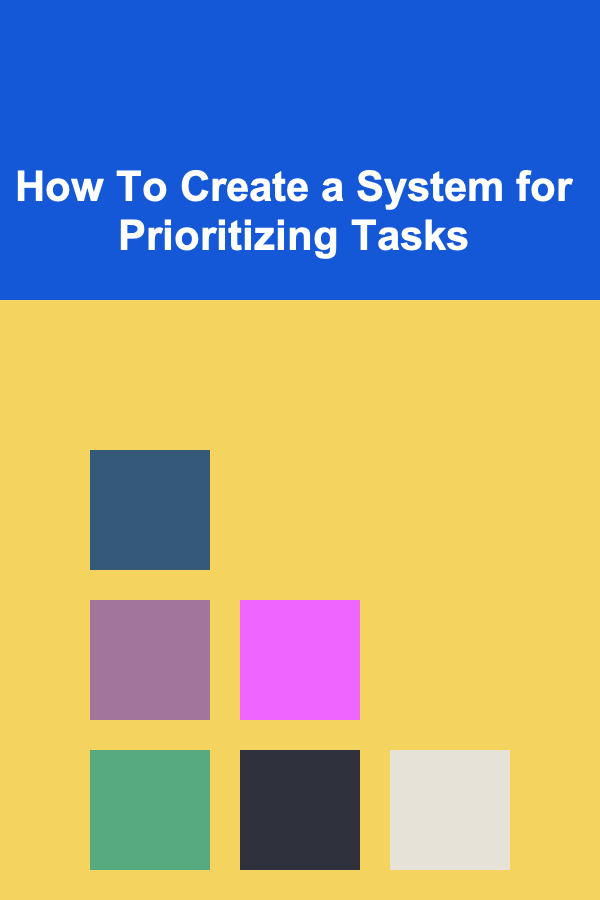
How to Create a Daily Schedule for Introverts
ebook include PDF & Audio bundle (Micro Guide)
$12.99$6.99
Limited Time Offer! Order within the next:
Not available at this time

Introversion is a personality trait characterized by a preference for solitude or minimal social interaction. Introverts often recharge by spending time alone, reflecting, and engaging in activities that allow for deep focus and introspection. As a result, creating a daily schedule that caters to an introvert's natural rhythms can help foster productivity, well-being, and overall life satisfaction.
Unlike extroverts, who gain energy from socializing and being around others, introverts may find themselves drained after long social engagements or busy, bustling environments. Designing a daily schedule that honors these tendencies can enable introverts to thrive both professionally and personally.
In this article, we will explore how introverts can build a daily schedule that prioritizes their need for solitude, rest, and deep focus while still accommodating work obligations and social commitments. We will provide practical tips and strategies to help introverts find balance and maximize their energy throughout the day.
Understand Your Peak Energy Times
The first step in creating a daily schedule for introverts is understanding when you feel most energized and productive during the day. Introverts, like everyone, experience fluctuations in energy levels, but for many, these shifts are tied to specific times of day.
Identify Peak Focus Times:
- Morning Focus: Many introverts find that their most productive hours are in the morning. They may feel sharp, clear-headed, and ready to tackle deep work during this time.
- Afternoon Slump: It is common for introverts to experience a dip in energy levels after lunch, making it harder to engage in tasks that require intense focus. This can be the ideal time for lighter work or self-care activities.
- Evening Productivity: Some introverts may find themselves more energetic and productive in the evening, particularly if they've had a quiet and restful day to recharge.
Pro Tip:
To maximize your productivity, design your schedule around your peak focus times. Block off time for the most demanding tasks when you're most alert and avoid important meetings or social events during your natural energy dips.
Prioritize Quiet and Alone Time
For introverts, solitude is a powerful way to recharge and maintain mental clarity. A daily schedule should include ample time for personal reflection, hobbies, and quiet activities that nourish the soul.
Key Ways to Incorporate Alone Time:
- Morning Rituals: Start your day with a quiet routine that allows you to ease into the day. This might include reading, journaling, meditation, or simply sipping coffee in silence.
- Solo Breaks: Throughout the day, make time for short breaks where you can be by yourself, even if it's just stepping away from your desk for a few minutes to take a walk or listen to music.
- Evening Wind-Down: End your day with a calming activity that doesn't involve external stimulation. This could include reading, writing, or engaging in a creative hobby that allows you to unwind and recharge for the next day.
Pro Tip:
Make alone time non-negotiable in your schedule. Even if it's just 15-30 minutes a day, carving out moments for yourself will help ensure you stay balanced and energized throughout the day.
Embrace Deep Work Blocks
Introverts tend to excel at deep, uninterrupted work. When designing a daily schedule, it's important to allocate blocks of time for focused tasks that require concentration and mental effort.
Tips for Deep Work:
- Time Blocking: Schedule specific blocks of time during the day dedicated to deep work. During these times, avoid checking your phone, emails, or social media to fully immerse yourself in the task at hand.
- Work in Long, Uninterrupted Segments: Aim for 90-minute to two-hour blocks of focused work. Introverts often perform best when they can engage in a task without interruption or distraction.
- Set Clear Priorities: Before starting your deep work sessions, identify the most important tasks to accomplish. This helps ensure that your energy is used efficiently and that you're making progress on meaningful projects.
Pro Tip:
Schedule deep work during your peak energy times---usually in the morning---when your mind is fresh and you're less likely to experience distractions.
Designate Time for Social Obligations (With Limits)
While introverts value their alone time, they also have social obligations---whether it's family, friends, or work-related events. The key for introverts is to balance these social commitments without overwhelming themselves.
Strategies for Managing Social Interactions:
- Limit Social Events: Be intentional about the social events you commit to. Accept only those that align with your interests or that offer value to your personal or professional life.
- Prepare Mentally: If you have a social event planned, allocate time before and after the event for quiet recovery. This allows you to recharge and avoid burnout.
- Opt for Smaller Gatherings: Large groups or noisy environments can be draining for introverts. Choose one-on-one or small group gatherings that allow for deeper conversations and meaningful connections.
Pro Tip:
Set a boundary for how much social interaction you can handle in a day or week. This might mean scheduling only one social activity per day or allocating certain days for solitude and self-care.
Set Realistic Work Goals
Introverts may find that they work best when they set clear, realistic goals for themselves. Rather than overloading your schedule with too many tasks, focus on what's achievable within a given timeframe. This allows for better time management and reduces the risk of feeling overwhelmed.
Tips for Setting Achievable Goals:
- Use the SMART Method: Set goals that are Specific, Measurable, Achievable, Relevant, and Time-bound. This framework helps break down larger projects into smaller, manageable steps.
- Prioritize Quality Over Quantity: Focus on delivering high-quality work rather than trying to accomplish everything at once. Introverts tend to thrive when they can devote their energy to fewer, more impactful tasks.
- Allow Flexibility: While structure is important, it's equally vital to build some flexibility into your schedule. This allows you to adapt to unexpected situations without feeling pressured.
Pro Tip:
Use a task management system or app, such as Todoist or Trello, to organize your tasks and goals for the day. Breaking your day into clear, prioritized tasks can help you stay on track and reduce decision fatigue.
Practice Self-Care Throughout the Day
Introverts often need extra time for self-care to ensure they don't burn out. Self-care isn't just about physical health; it's also about emotional and mental well-being. Incorporating these practices into your schedule can help introverts maintain balance and stay grounded.
Daily Self-Care Ideas:
- Mindful Movement: Engage in activities like yoga, stretching, or a walk outdoors to get your body moving and clear your mind.
- Meditation and Mindfulness: Take time for mindfulness practices, such as deep breathing, meditation, or journaling, to help reduce stress and stay centered.
- Creative Outlets: Introverts often enjoy engaging in creative activities that allow for personal expression. Whether it's painting, writing, or playing an instrument, carve out time for these hobbies as part of your self-care routine.
Pro Tip:
Incorporate self-care into your daily schedule just like any other task. By giving yourself permission to prioritize your well-being, you'll be able to sustain your energy and productivity over the long term.
Limit Distractions and Create a Peaceful Workspace
A cluttered or chaotic workspace can be distracting for introverts, so it's essential to create an environment that promotes focus and calm. This will help you stay productive and minimize feelings of overwhelm.
Tips for a Productive Environment:
- Declutter Your Workspace: Keep only the essentials on your desk. A clean, organized workspace fosters clarity and reduces distractions.
- Set Boundaries for Digital Distractions: Limit your exposure to social media and unnecessary digital interruptions. Use apps like "Focus@Will" or "Forest" to stay focused and manage your screen time.
- Create a Comfortable Environment: Ensure your workspace is comfortable---whether it's through ergonomic furniture, good lighting, or soothing décor that helps you feel at ease.
Pro Tip:
Consider using noise-canceling headphones if you're in a shared space. This can help create an environment conducive to focus and prevent distractions.
Balance Work and Rest Periods
Introverts can be highly productive when they manage their energy well. A crucial part of this is balancing work periods with rest periods. Overworking can lead to burnout, so it's essential to give yourself time to recharge during the day.
Ideas for Balancing Work and Rest:
- Pomodoro Technique: Work in 25-minute bursts, followed by a 5-minute break. After four cycles, take a longer break of 15-30 minutes.
- Scheduled Downtime: In addition to short breaks, allocate larger chunks of time during the day for relaxation, such as a lunch break or an afternoon nap.
- Disconnect at the End of the Day: Make sure you have a defined boundary for when your workday ends. Allow yourself time to unwind before transitioning into personal or family time.
Pro Tip:
Taking breaks is just as important as working. A well-rested introvert is more productive than one who pushes through without pause. Ensure that rest is prioritized in your schedule to maintain long-term productivity.
Incorporate Reflection and Planning Time
Introverts often benefit from time spent reflecting on their experiences and planning for the future. This can be a calming practice that promotes personal growth and sets you up for success.
Ideas for Reflection and Planning:
- Daily Reflection: Take time at the end of each day to reflect on what went well, what could have been improved, and what you're grateful for.
- Weekly Planning: Every week, set aside time to plan your upcoming schedule. This allows you to prepare for the week ahead and ensures you're staying on top of tasks.
- Journaling: Writing down your thoughts and ideas can be a powerful way to process emotions and plan your future. It also serves as a creative outlet.
Pro Tip:
Incorporating reflection and planning time into your daily routine will help you stay mindful of your goals, track your progress, and ensure that you remain aligned with your values.
Adapt and Experiment
The final tip is to remain flexible and willing to experiment with different schedules until you find what works best for you. Your energy levels and preferences may change over time, and your ideal schedule may need adjustments based on personal or professional shifts.
Tips for Flexibility:
- Experiment with Time Blocks: Try different time blocks for deep work, social interactions, and rest. See what works best for you and refine your schedule accordingly.
- Assess Weekly: At the end of each week, evaluate how your schedule worked for you. Are you feeling more energized and productive, or do you need more downtime?
Pro Tip:
Allow yourself to be fluid in your approach to scheduling. Life is dynamic, and finding a schedule that serves you may take time and experimentation.
Creating a daily schedule tailored to the needs of an introvert can be an empowering tool to optimize energy, productivity, and overall well-being. By focusing on solitude, managing social commitments, setting clear goals, and prioritizing self-care, introverts can create a balanced routine that supports their unique strengths. The key is to be mindful of your natural rhythms and to structure your day in a way that nurtures both your professional aspirations and your personal needs.

How To Build a Simple CRUD Application
Read More
How To Create a System for Prioritizing Tasks
Read More
How to Organize a Family Cookie Decorating Contest
Read More
How to Master Resource Management in Board Games
Read More
How To Research Marine Mammal Behavior
Read More
10 Tips for Extract Brewing Success
Read MoreOther Products

How To Build a Simple CRUD Application
Read More
How To Create a System for Prioritizing Tasks
Read More
How to Organize a Family Cookie Decorating Contest
Read More
How to Master Resource Management in Board Games
Read More
How To Research Marine Mammal Behavior
Read More